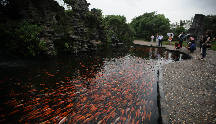Land Transfers Support Modern Agriculture in Xiaogang Village
Land Transfer: Necessary for Modern Agriculture
In Xiaogang, a spate of one-story houses are clustered among stretches of farmland. The village is quiet and peaceful, like most rural communities in the country. Guan Youjiang, deputy director of Xiaogang Village Committee, pointed to the asphalt road and said, "This road was built a few years ago. It makes it more convenient to go out." Before 2004, there was only a dirt road leading to and from the village, and it had no running water. Statistics show in 2003 the per capita annual income was only RMB 2,300, and this figure jumped to RMB 4,000 in 2005, but remains modest.
In Guan Youjiang's view, the main reason that Xiaogang cannot move beyond poverty is its dependence on the monoculture of grain crops. Zhou Decui, a 37-year-old farmer in Xiaogang, has been engaged in farming since her childhood. Like her fellow villagers, she mainly grows grain crops such as rice and wheat. "It is all right when we have good weather for the year, but once a natural disaster hits, agriculture is seriously affected," Zhou said. Even with good weather, the annual net income of one mu (15 mu = 1 hectare) of land is a paltry RMB 300, after deducting grain ration and such costs as seeds and fertilizers.
In fact, Xiaogang is typical of many such villages in China, featuring a lack of resources and poor links to transportation routes. Farmers mainly depend on growing grain crops to make a living, while members of the younger generation often choose to seek employment in cities.
"Household-based modes of production are characterized by low productivity and poor risk management. A grain monoculture does not lead to a life of wealth, it only solves the problems of adequate food and clothing," said Guan Youjiang. "We have been thinking about ways to improve productivity and cater to the needs of modern agricultural development, so our limited land resources can perform a little better."
In 2009 the GLG Natural Zero-calorie Hi-tech Industrial Park was built at the western edge of Xiaogang Village. The Gerson Lehrman Group (GLG) of the United States was its investor, and its main operations are stevia breeding and intensive processing of this crop. The first transnational enterprise to settle in Xiaogang brought vitality and vigor to this peaceful village.
The industrial park occupies 2,000 mu of land, all of it transferred, or subcontracted, by farmers. Zhou Decui transferred 10 mu (half of her family's contracted land) to the GLG, and she and her husband are employed by the American company as well. Zhou Decui works as a canteen manager for a monthly salary of RMB 1,000. Her husband's good skills earned him a promotion to the post of workshop team leader earning RMB 1,700.
"The annual price for land transfer per mu is calculated using the price of 350 kilograms of grain. No matter what the weather is like, we can get this money from a land transfer," said Zhou Decui. "In addition, we are paid staff." The GLG Xiaogang Village Natural Zero-calorie Hi-tech Industrial Park has 200 employees, and 150 are local farmers.
A stevia breeding base is taking shape in Xiaogang. Local farmers gladly embraced this cash crop after extensive promotion by the GLG, which also provides seeds and technical consultation to growers. "I never knew that stevia was so high-yielding and could fetch so much money," villager Mei Caihong said. Now stevia crop coverage has reached 200 mu. Despite the extreme weather of 2009, the villagers who were cultivating this plant on a trial basis all brought in a good harvest; their per mu income exceeded RMB 3,000.
To the south of Xiaogang Village an expanse of vegetable greenhouses were under construction, adding up to 1,000 mu. The land was leased by Guangdong Congyu Vegetable Development Co., Ltd., which intends to build greenhouses, high-durability plastic tents and a testing center. Meanwhile, the Tianjin Baodi Agricultural Sci-tech Group has signed a cooperation agreement with Xiaogang to develop livestock breeding.
In fact, practicing land transfer and pooling small plots of land to allow large-scale operations is a development road that many rural areas are now feeling their way along. "We hope land transfer deals will fuel intensive agricultural production and attract large enterprises to Xiaogang," said Guan Youjiang. "I also hope the enterprises will provide advanced planting technologies, and optimize our crop structure, consequently ramping up our land proceeds." In 2010, the per capita annual income of Xiaogang Village reached RMB 6,700.
Services
Economy
- Eco-agriculture and Eco-tourism Power Nanchang’s Green Development
- Balance Environmental Protection and Economic Prosperity – Nanchang Looks to European Technology for Green Development
- Sustainable Growth Requires Wiser Energy Use
- Chinese Economy: On the Path of Scientific Development
- China's Economy over the Last Ten Years

